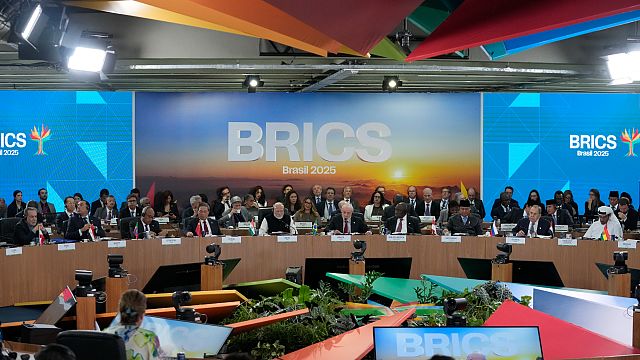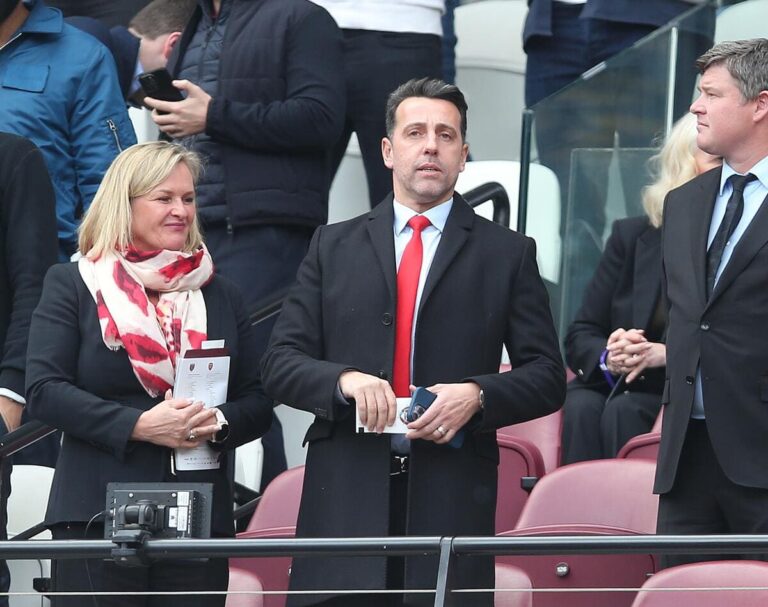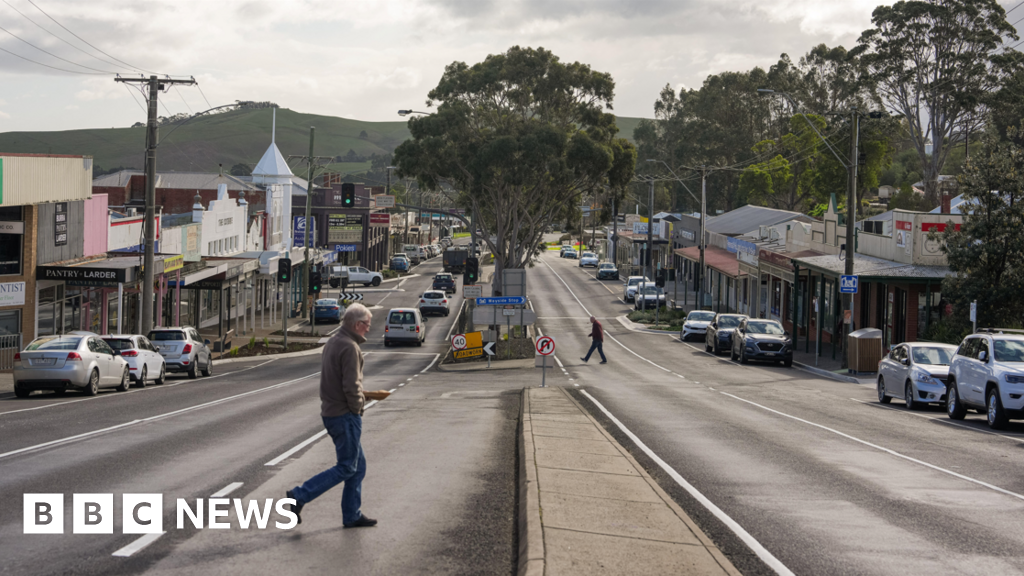Energy bills to fall by 7% from July

Energy bills to fall for first time in a year from July
Kevin PeacheyCost of living correspondent, BBC News
 Getty Images
Getty ImagesEnergy bills will fall by 7% in July - the first drop for a year, energy regulator Ofgem has announced.
It means a household using a typical amount of gas and electricity will see their annual bill fall by £129.
The regulator's price cap, which is set every three months, sets a maximum that suppliers can charge for each unit of energy, affecting 21 million households in England, Scotland and Wales.
Charities say cheaper bills are welcome but many people still struggle to pay, with millions of customers collectively owing about £4bn to suppliers.
The price cap does not apply in Northern Ireland, which has its own energy market.
Customers can estimate their own potential saving in energy bills in July by knocking 7% off their monthly direct debit. On average that will be about £11 a month.
The cheaper bills will kick in at the warmest time of the year, when energy use is lower, but analysts expect little change in prices come October.
Tim Jarvis, director general of markets at Ofgem, said the drop in energy bills reflected a fall in the international price of wholesale gas.
"However, we're acutely aware that prices remain high, and some continue to struggle with the cost of energy," he added.
Households were hit by a series of bill hikes for energy, water and council tax at the start of April, which drove inflation, which charts the rising cost of living, to its highest for more than a year.
Although the energy cap changes every three months, the regulator illustrates the effect of this with the annual bill for a household using a typical amount of gas and electricity.
This typical household is assumed to use 11,500 kWh of gas and 2,700 kWh of electricity a year with a single bill for gas and electricity, settled by direct debit.
The 7% fall will mean a typical annual bill for a dual-fuel customer paying by direct debit will cost £1,720, down from the current level of £1,849.
It will also more than reverse the £111 increase under the current price cap, which came into force at the start of April.
However, prices will still be higher than a year earlier, and significantly above levels seen at the start of the decade.

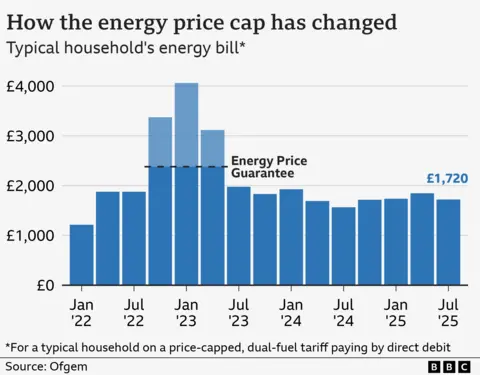
High bills in recent years have also led to ballooning levels of customer debt to suppliers, with just under £4bn owed.
Dame Clare Moriarty, chief executive at Citizens Advice, said the latest energy price cap announcement would be "cold comfort to the millions paying off a mountain of debt on top of their monthly costs".
"The government has said it hopes to provide more support to pensioners this winter, but we know that people with children are often struggling most of all with energy," she said.
"It must provide more targeted energy bill support to those hardest hit, and upgrade five million homes with money-saving energy efficiency measures."
Ofgem has pointed to cheaper options available for households willing to switch to a fixed deal, although customers who are saddled with debt may not be allowed to switch.

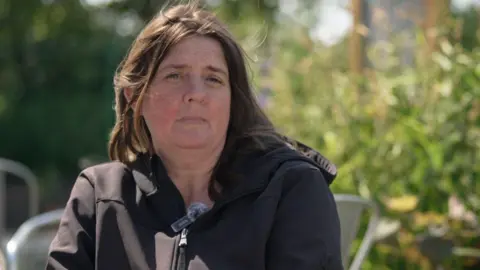
At Seedley Pavilion Community Cafe and Gardens in Salford, they are growing produce to try to keep costs down.
Gillian Roberts, 49, said it was "about time" energy prices start to fall.
"I used to stay at my friend's house most of the time so I wouldn't be at my flat using energy. I'd be there so we could split the cost of energy and pay it together," she said.
"I have a meter that I read once a month and I just keep my eye on things as much as I possibly can."
Winter fuel payment row
The price cap announcement comes just two days after Prime Minister Sir Keir Starmer signalled a partial U-turn on cuts to winter fuel payments.
More than 10 million pensioners lost out on the payments, worth up to £300 when the top-up became means-tested last year.
However, Sir Keir said on Wednesday that the government wanted "more pensioners" to be eligible again.
It remains unclear how many will regain their entitlement for the payments, how that will be achieved, or when the changes will take effect.
Standing charges
Bills are calculated based on individual usage. However, standing charges, which cover the cost of being connected to an energy supply, are fixed.
The regulator said these charges would typically drop by £19 a year under the July cap for people on variable tariffs or prepayment meters, although they vary sharply by region.
The latest changes mean that in July:
- Gas prices will be capped at an average of 6.33p per kilowatt hour (kWh), and electricity at 25.73p per kWh - down from 6.99p and 27.03p respectively. A typical household uses 2,700 kWh of electricity a year, and 11,500 kWh of gas
- Households on pre-payment meters will pay slightly less than those on direct debit, with a typical annual bill of £1,672
- Those who pay their bills by cash or cheque will pay more, with a typical annual bill of £1,855
- Standing charges will fall to 51.37p a day for electricity and to 29.82p a day for gas, compared with 53.8p and 32.67p respectively, although they vary by region
The regulator is consider changes to the system of standing charges, although that has brought renewed debate over how they operate.
Additional reporting by Abi Smitton
What's Your Reaction?
 Like
0
Like
0
 Dislike
0
Dislike
0
 Love
0
Love
0
 Funny
0
Funny
0
 Angry
0
Angry
0
 Sad
0
Sad
0
 Wow
0
Wow
0


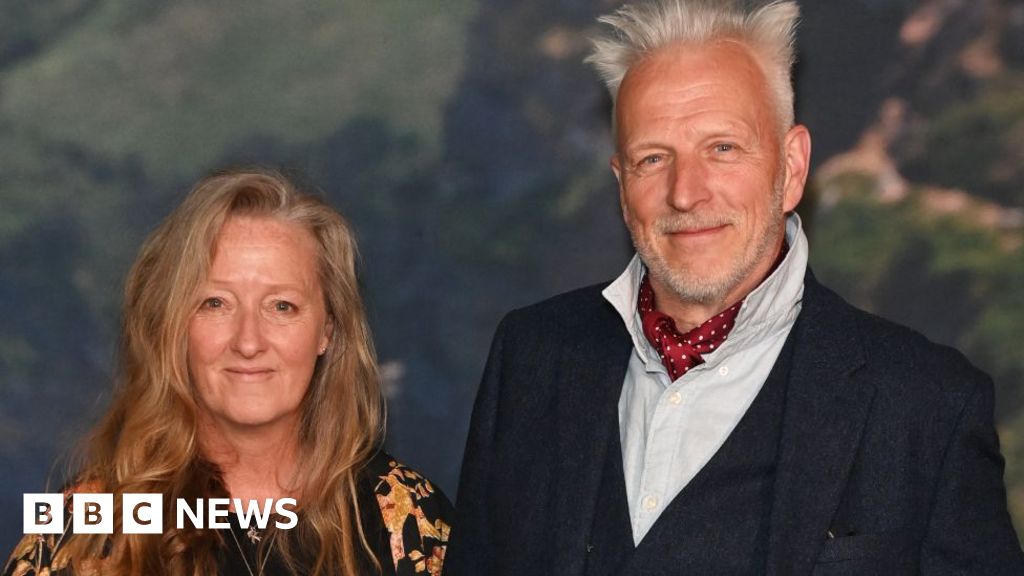
![Kenya : la rue réclame la démission du président Ruto [Africanews Today]](http://static.euronews.com/articles/stories/09/35/98/44/640x360_cmsv2_243b313e-c311-5f0c-a360-9c99f74e79bd-9359844.jpg?1751890233#)

